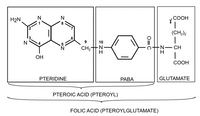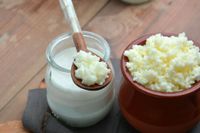Folate
Folate is the collective name of all bioactive forms of same basic molecule, also known as vitamin B9 (the term folic acid is the synthetic reduced form of B9, which must be transformed in the liver to become bioactive). Folate is an essential co-factor in many reactions (carying and delivering 1-carbon goups) necessary for DNA and RNA synthesis, methylation processes and much more, in all cells and organisms.
Folate deficiency is a well known global problem for vulnurabe population groups (people in low income countries, elderly, women at childbearing age and anyone eating generally poor diet).
Suboptimal intake of folate increases the risk for neural tube defects, anaemia, and probably several cancer forms, cognitive decline and cardiovascular disease
Certain high folate yeast strains have a naturally high capacity to produce folate to levels (folate per weight) exceeding the folate content in all other natural food products, including for instance liver, beans and broccoli.
After many years research on folate biosynthesis and metabolism in yeasts we have knowledge on how to culture yeast to reach a high folate state, i.e. to boost the folate biosynthesis and content.
Strains matter as do the bioprocessing. We have shown a tremendous increase in for instance bread by using both naturally high folate yeast strains of Saccharomyces cerevisiae (Baker's yeast) and optimized culturing conditions
High folate yeasts together with bioprocessing can be used to produce high folate foods (without any addition of synthetic folic acid). This means a completely natural biofortification which can be applied on e.g bread, kefir or any other fermented product ín which yeast is a part.
Same strategy can be used to also produce so called Nutritional Yeast (dried yeast flakes) with much higher folate content compared with such products currently commercially produced.
High folate bifidobacteria - In collaboration with University of Bologna and Professor Paola Mattarelli in Bologna University we have for many years done research also on high folate bifidobacteria.
Bifidobacteria are important in a healthy human gut biota and we have identified folate producing bifidobacteria bifido-species which are a natural part of the human gut biota.
In addition to high folate foods, we propose the concept folate probiotics. This means that a folate producing gut colonizing microorganism can produce folate in our intestine which can be absorbed by our intestinal epoithelia cells. This type of trophic probiotic applies to both yeasts and bifidobacteria
Food producers and biotech companies are welcome to contact us for discussion on natural folate bioenrichment or any research group to discuss collaborating in for instance evaluating folate probiotics.
Folate References (for complete list see Google Scholar)
2005 Effect of cultivation conditions on folate content in yeast: Exploring the potential of yeast as a bio-enrichment vehicle for folate in foods
S Hjortmo, J Patring, J Jastrebova, T Andlid
JOURNAL OF BIOTECHNOLOGY 118, S135-S136
2005 Inherent biodiversity of folate content and composition in yeasts
S Hjortmo, J Patring, J Jastrebova, T Andlid
Trends in food science & technology 16 (6-7), 311-316
2005 Development of a simplified method for the determination of folates in baker's yeast by HPLC with ultraviolet and fluorescence detection
JDM Patring, JA Jastrebova, SB Hjortmo, TA Andlid, IM Jägerstad
Journal of Agricultural and Food Chemistry 53 (7), 2406-2411
2006 Characterization and quantification of folates produced by yeast strains isolated from kefir granules
JDM Patring, SB Hjortmo, JA Jastrebova, UK Svensson, TA Andlid, ...
European Food Research and Technology 223, 633-637
2008 Biofortification of folates in white wheat bread by selection of yeast strain and process
S Hjortmo, J Patring, J Jastrebova, T Andlid
International Journal of Food Microbiology 127 (1-2), 32-36
2008 Production of folates by yeasts in Tanzanian fermented togwa
SB Hjortmo, AM Hellström, TA Andlid
FEMS yeast research 8 (5), 781-787
2008 Growth rate and medium composition strongly affect folate content in Saccharomyces cerevisiae
S Hjortmo, J Patring, T Andlid
International journal of food microbiology 123 (1-2), 93-100
2010 Folate and phytase produced by yeasts
T Andlid, J Veide, S Hjortmo, A Hellström
Proceedings of the 23rd VH-Yeast Conference April 26-27, 2010 in Vienna
2012 The potential of bifidobacteria as a source of natural folate
MR D’Aimmo, P Mattarelli, B Biavati, NG Carlsson, T Andlid
Journal of applied microbiology 112 (5), 975-984
2014 Biosynthesis and cellular content of folate in bifidobacteria across host species with different diets
MR D'Aimmo, M Modesto, P Mattarelli, B Biavati, T Andlid
Anaerobe 30, 169-177
2018 Folate and bifidobacteria
TA Andlid, MR D’Aimmo, J Jastrebova
Chapter 11 in "The bifidobacteria and related organisms", 195-212


